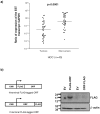Genome-wide association study of hepatocellular carcinoma in Southern Chinese patients with chronic hepatitis B virus infection
- PMID: 22174901
- PMCID: PMC3234276
- DOI: 10.1371/journal.pone.0028798
Genome-wide association study of hepatocellular carcinoma in Southern Chinese patients with chronic hepatitis B virus infection
Abstract
One of the most relevant risk factors for hepatocellular carcinoma (HCC) development is chronic hepatitis B virus (HBV) infection, but only a fraction of chronic HBV carriers develop HCC, indicating that complex interactions among viral, environmental and genetic factors lead to HCC in HBV-infected patients. So far, host genetic factors have incompletely been characterized. Therefore, we performed a genome-wide association (GWA) study in a Southern Chinese cohort consisting of 95 HBV-infected HCC patients (cases) and 97 HBV-infected patients without HCC (controls) using the Illumina Human610-Quad BeadChips. The top single nucleotide polymorphisms (SNPs) were then validated in an independent cohort of 500 cases and 728 controls. 4 SNPs (rs12682266, rs7821974, rs2275959, rs1573266) at chromosome 8p12 showed consistent association in both the GWA and replication phases (OR(combined) = 1.31-1.39; p(combined) = 2.71 × 10(-5)-5.19 × 10(-4); PAR(combined) = 26-31%). We found a 2.3-kb expressed sequence tag (EST) in the region using in-silico data mining and verified the existence of the full-length EST experimentally. The expression level of the EST was significantly reduced in human HCC tumors in comparison to the corresponding non-tumorous liver tissues (P<0.001). Results from sequence analysis and in-vitro protein translation study suggest that the transcript might function as a long non-coding RNA. In summary, our study suggests that variations at chromosome 8p12 may promote HCC in patients with HBV. Further functional studies of this region may help understand HBV-associated hepatocarcinogenesis.
Conflict of interest statement
Figures


Similar articles
-
Genome-Wide Association Study Identifies a New Locus at 7q21.13 Associated with Hepatitis B Virus-Related Hepatocellular Carcinoma.Clin Cancer Res. 2018 Feb 15;24(4):906-915. doi: 10.1158/1078-0432.CCR-17-2537. Epub 2017 Dec 15. Clin Cancer Res. 2018. PMID: 29246937
-
Genome-wide association study identifies 1p36.22 as a new susceptibility locus for hepatocellular carcinoma in chronic hepatitis B virus carriers.Nat Genet. 2010 Sep;42(9):755-8. doi: 10.1038/ng.638. Epub 2010 Aug 1. Nat Genet. 2010. PMID: 20676096
-
Variants identified by hepatocellular carcinoma and chronic hepatitis B virus infection susceptibility GWAS associated with survival in HBV-related hepatocellular carcinoma.PLoS One. 2014 Jul 2;9(7):e101586. doi: 10.1371/journal.pone.0101586. eCollection 2014. PLoS One. 2014. PMID: 24987808 Free PMC article.
-
PNPLA3 rs738409 is not associated with the risk of hepatocellular carcinoma and persistent infection of hepatitis B virus (HBV) in HBV-related subjects: A case-control study and meta-analysis on Asians.Gene. 2020 Jun 5;742:144585. doi: 10.1016/j.gene.2020.144585. Epub 2020 Mar 13. Gene. 2020. PMID: 32173542
-
Single nucleotide polymorphisms associated with hepatocellular carcinoma in patients with chronic hepatitis B virus infection.Intervirology. 2005;48(1):10-5. doi: 10.1159/000082089. Intervirology. 2005. PMID: 15785084 Review.
Cited by
-
A rationalized approach to the treatment of patients infected with hepatitis B.Mol Diagn Ther. 2014 Apr;18(2):203-12. doi: 10.1007/s40291-013-0072-1. Mol Diagn Ther. 2014. PMID: 24297152 Review.
-
Long Non-Coding RNAs in Infection Biology.Front Genet. 2013 Jan 9;3:308. doi: 10.3389/fgene.2012.00308. eCollection 2012. Front Genet. 2013. PMID: 23316211 Free PMC article.
-
Hepatocellular carcinoma: clinical frontiers and perspectives.Gut. 2014 May;63(5):844-55. doi: 10.1136/gutjnl-2013-306627. Epub 2014 Feb 14. Gut. 2014. PMID: 24531850 Free PMC article. Review.
-
Role of HLA-DP polymorphisms on chronicity and disease activity of hepatitis B infection in Southern Chinese.PLoS One. 2013 Jun 25;8(6):e66920. doi: 10.1371/journal.pone.0066920. Print 2013. PLoS One. 2013. PMID: 23825586 Free PMC article.
-
No association for Chinese HBV-related hepatocellular carcinoma susceptibility SNP in other East Asian populations.BMC Med Genet. 2012 Jun 19;13:47. doi: 10.1186/1471-2350-13-47. BMC Med Genet. 2012. PMID: 22712471 Free PMC article.
References
-
- Lai CL, Yuen MF. Chronic hepatitis B–new goals, new treatment. N Engl J Med. 2008;359:2488–2491. - PubMed
-
- Lavanchy D. Hepatitis B virus epidemiology, disease burden, treatment, and current and emerging prevention and control measures. J Viral Hepat. 2004;11:97–107. - PubMed
-
- Chen CC, Yang SY, Liu CJ, Lin CL, Liaw YF, et al. Association of cytokine and DNA repair gene polymorphisms with hepatitis B-related hepatocellular carcinoma. Int J Epidemiol. 2005;34:1310–1318. - PubMed
-
- Kummee P, Tangkijvanich P, Poovorawan Y, Hirankarn N. Association of HLA-DRB1*13 and TNF-alpha gene polymorphisms with clearance of chronic hepatitis B infection and risk of hepatocellular carcinoma in Thai population. J Viral Hepat. 2007;14:841–848. - PubMed
-
- Migita K, Miyazoe S, Maeda Y, Daikoku M, Abiru S, et al. Cytokine gene polymorphisms in Japanese patients with hepatitis B virus infection–association between TGF-beta1 polymorphisms and hepatocellular carcinoma. J Hepatol. 2005;42:505–510. - PubMed
Publication types
MeSH terms
LinkOut - more resources
Full Text Sources
Medical
Research Materials

